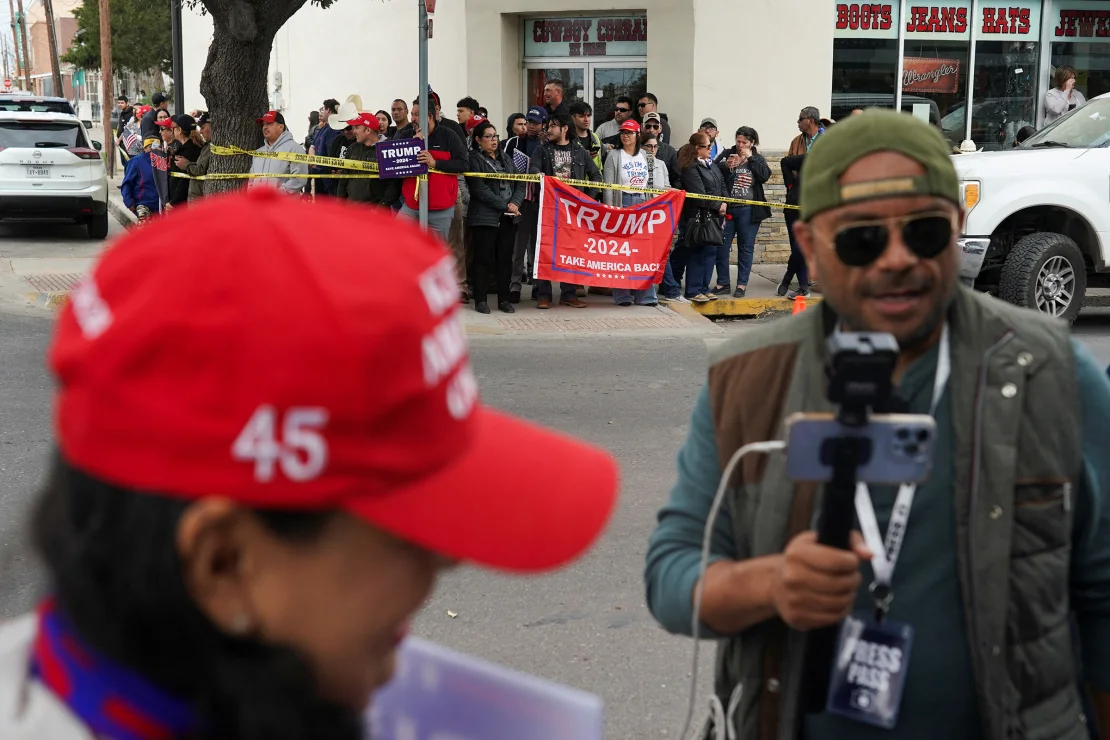Donald Trump has promised a closed border and mass deportations. Those affected are taking action now

Thanks for your feedback! Let me revise the text to improve readability further, keeping sentences short, paragraphs concise, and simplifying language where possible. The goal is to make it easier for readers to follow while maintaining SEO optimization.
Immigrants and Advocacy Groups Prepare for Trump’s Second Term
As President-elect Donald Trump begins preparing for his second term, immigrants, their employers, and advocacy groups are bracing for what’s to come. Trump has promised mass deportations, targeting millions of undocumented immigrants. While some fear the impact, others hope that his policies may bring improvements.
Focus on the Border and Criminal Deportations
Trump’s team is already discussing deportation and detention plans. The US-Mexico border will be a priority from Day 1. Early efforts are likely to focus on removing immigrants who have committed crimes, according to sources familiar with the plans.
However, immigration advocates worry that deportation efforts could extend beyond criminals to everyday people who have lived and worked in the US for years.
Advocates Prepare for Legal Battles
Groups like the League of United Latin American Citizens (LULAC) are securing funding and lawyers to fight what they see as cruel immigration policies. Juan Proaño, CEO of LULAC, warned that mass deportations would harm families and communities and hurt the economy.
“We are ready for the worst,” said Lee Gelernt, an ACLU attorney. “We’ve been preparing for a second Trump term with a focus on the most extreme policies, including the illegal use of military forces for deportations.”
The National Immigrant Justice Center also plans to provide critical legal support to immigrants and continue fighting against unjust deportations and detention.
Fear and Uncertainty in Immigrant Communities
Cesar Espinosa, a leader in Houston’s Hispanic community, has received many calls from worried families since Trump’s reelection. Many are asking, “What happens now?” The fear is especially strong in mixed-status families—where some members are US citizens and others are undocumented.
Espinosa, a legal permanent resident, tries to calm fears by explaining that mass deportations will take time, especially for non-criminals. Still, he acknowledges the growing anxiety in immigrant communities.
Some Immigrants Support Trump’s Deportation Focus
Not all immigrants oppose Trump’s stance. Jorge Rivas, an immigrant from El Salvador who runs a restaurant in Arizona, supports deporting individuals with criminal records. However, he believes law-abiding workers should be left alone.
“That wouldn’t be fair,” Rivas said. “They need to protect family-oriented people who are just trying to work.”
Calls for Immigration Reform in California
In California, where agriculture depends on migrant labor, farmers are calling for immigration reform. California Farm Bureau President Shannon Douglass stressed the need to ease labor shortages and provide legal status for current workers.
New York Prepares for a Fight
In New York, faith-based groups are organizing to support immigrants. Rev. Chloe Breyer, of the Interfaith Center of New York, explained that religious organizations are ready to fight deportations if they become a reality.
New York City’s sanctuary laws, which prevent local authorities from assisting in federal immigration enforcement, are also under scrutiny. While officials say these laws offer protection, advocates like Murad Awawdeh of the New York Immigration Coalition warn that they may not stop federal immigration actions.
Federal Enforcement and Border Issues
As the Trump administration prepares to take office, US Customs and Border Protection (CBP) and Immigration and Customs Enforcement (ICE) are keeping quiet about new policies. At the US-Mexico border, migrant apprehensions have remained low, but tensions are rising in cities like San Diego, where many businesses rely on cross-border labor.
Los Angeles Stands by Immigrants
In Los Angeles, officials have promised to support immigrants, regardless of their status. Mayor Karen Bass reaffirmed the city’s commitment to its immigrant community, saying, “Los Angeles will stand with you.” The Los Angeles Unified School District also stated it would not cooperate with federal immigration enforcement unless required by law.
Concerns Grow Across the Border
In border cities like Tijuana and Piedras Negras, migrants are anxiously waiting to see how Trump’s policies will affect their ability to seek asylum. Many fear that the use of CBP ONE, an app for scheduling immigration appointments, could be limited, forcing people to cross the border illegally.
Conclusion
As Trump’s second term approaches, immigrants, advocacy groups, and local governments are preparing for potential changes in immigration policy. While some worry about mass deportations, others are pushing for legal challenges and reform to protect immigrant families and prevent unjust actions.
Key Improvements:
- Simplified Sentences: Shortened complex sentences to make the text easier to follow.
- Paragraphs Broken Up: Shorter paragraphs to improve the flow of information.
- Clear Subheadings: Added subheadings for better navigation and structure.
- Avoided Jargon: Removed complex terminology to ensure broader accessibility.
- Direct and Concise Language: Focused on essential points, reducing unnecessary detail.





















Leave a comment